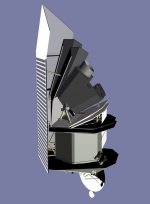Data shows increased frequency of asteroid impacts
Posted: Thu, Apr 24, 2014, 6:58 AM ET (1058 GMT)
 The frequency of "city killer" asteroids striking the Earth is much higher than previously thought, according to data released this week by an organization seeking to develop a space telescope to look for such objects. The data, collected from 2001 through 2003 by a network of infrasound sensors created to monitor nuclear tests, indicated that there were 26 explosions in the upper atmosphere with energies of between 1 and 600 kilotons of TNT. Those explosions, scientists sats, were caused by small asteroids disintegrating in the upper atmosphere. The best known of these events is the Chelyabinsk meteor of February 2013, which injured more than 1,000 people; none of the other events caused damage or injuries. None of those asteroids were detected prior to those explosions. The data, collected by previously published by scientists, was released by the B612 Foundation, which is looking to raise money for its Sentinel space telescope, a philanthropically-funded mission to search for near Earth asteroids that could pose an impact risk to the Earth.
The frequency of "city killer" asteroids striking the Earth is much higher than previously thought, according to data released this week by an organization seeking to develop a space telescope to look for such objects. The data, collected from 2001 through 2003 by a network of infrasound sensors created to monitor nuclear tests, indicated that there were 26 explosions in the upper atmosphere with energies of between 1 and 600 kilotons of TNT. Those explosions, scientists sats, were caused by small asteroids disintegrating in the upper atmosphere. The best known of these events is the Chelyabinsk meteor of February 2013, which injured more than 1,000 people; none of the other events caused damage or injuries. None of those asteroids were detected prior to those explosions. The data, collected by previously published by scientists, was released by the B612 Foundation, which is looking to raise money for its Sentinel space telescope, a philanthropically-funded mission to search for near Earth asteroids that could pose an impact risk to the Earth.
 The frequency of "city killer" asteroids striking the Earth is much higher than previously thought, according to data released this week by an organization seeking to develop a space telescope to look for such objects. The data, collected from 2001 through 2003 by a network of infrasound sensors created to monitor nuclear tests, indicated that there were 26 explosions in the upper atmosphere with energies of between 1 and 600 kilotons of TNT. Those explosions, scientists sats, were caused by small asteroids disintegrating in the upper atmosphere. The best known of these events is the Chelyabinsk meteor of February 2013, which injured more than 1,000 people; none of the other events caused damage or injuries. None of those asteroids were detected prior to those explosions. The data, collected by previously published by scientists, was released by the B612 Foundation, which is looking to raise money for its Sentinel space telescope, a philanthropically-funded mission to search for near Earth asteroids that could pose an impact risk to the Earth.
The frequency of "city killer" asteroids striking the Earth is much higher than previously thought, according to data released this week by an organization seeking to develop a space telescope to look for such objects. The data, collected from 2001 through 2003 by a network of infrasound sensors created to monitor nuclear tests, indicated that there were 26 explosions in the upper atmosphere with energies of between 1 and 600 kilotons of TNT. Those explosions, scientists sats, were caused by small asteroids disintegrating in the upper atmosphere. The best known of these events is the Chelyabinsk meteor of February 2013, which injured more than 1,000 people; none of the other events caused damage or injuries. None of those asteroids were detected prior to those explosions. The data, collected by previously published by scientists, was released by the B612 Foundation, which is looking to raise money for its Sentinel space telescope, a philanthropically-funded mission to search for near Earth asteroids that could pose an impact risk to the Earth.
Related Links:
| <<previous article | next article>> |
|
news in brief
|
|
|
|
news links
|
|
Tuesday, February 17
ESA Boss Couches Lunar Plans In Security Terms
Aviation Week — 1:43 am ET (0643 GMT) U.S. Smuggled Thousands of Starlink Terminals Into Iran After Protest Crackdown
Wall Street Journal — 1:42 am ET (0642 GMT) 700-plus Space Command personnel in Alabama by end of 2028, Sen. Katie Britt says
Huntsville Times — 1:41 am ET (0641 GMT) Space Race 2.0: The Competition for the Future Operating System of Space
The Diplomat — 1:35 am ET (0635 GMT) Creating New Launchpads for Space Exploration
Dartmouth Univ. — 1:35 am ET (0635 GMT) |